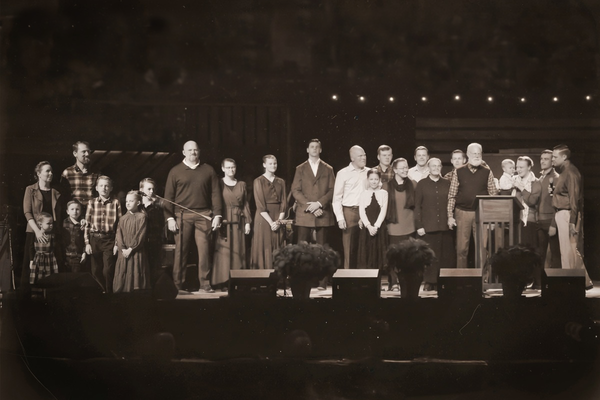Groaning but Not Separated
In a world that worships feelings, many believers unknowingly bow to emotional lies. But emotions are not sovereign—Jesus is. This post is a call to take every thought captive, confront deception with truth, and walk in obedience even when feelings rebel.

Taking Authority over Harmful Feelings
The Lie of Emotional Sovereignty
We live in an age where feelings are enthroned. They are treated as sovereign, obeyed as if they were divine. “Follow your heart,” the world preaches—never mind that Scripture says the heart is “deceitful above all things and desperately wicked” (Jer. 17:9). But even in the church, this subtle idolatry has crept in. We often give feelings the final word in matters of identity, calling, worth, and even truth itself.
This must end. Emotions are not God. They are not the Holy Spirit. They are not even accurate half the time. They can be informed by truth, yes—but they can also be shaped by blood sugar, insomnia, hormones, hardship, or lies whispered in the night. They can be redeemed and refined, but they are not to be trusted blindly.
God may use feelings to confirm His presence or stir our hearts, but He never subjects His truth to our emotions. His promises do not fluctuate with our mood swings. He is not absent just because we feel numb. He is not displeased just because we feel shame. If the Word says, “I will never leave you or forsake you” (Heb. 13:5), then that is the final word—no matter how condemned or empty we feel.
And if your feelings contradict the Word of God, they are not neutral. They are enemies. They must be cast down and crucified.
“For the weapons of our warfare are not carnal but mighty in God for pulling down strongholds, casting down arguments and every high thing that exalts itself against the knowledge of God” (2 Cor. 10:4–5).
What is the “argument” most believers face? It’s the voice that says: “You’re a failure. God is far. You’re condemned.” These are strongholds—fortresses of falsehood built by emotional agreement with lies. And the Word commands us to tear them down.
You do not coddle those thoughts. You do not sit with them and have tea. You take up the sword of the Spirit and stab the lie in its substance.
“This is not from God.”
“This feeling is not truth.”
“This voice is not the Shepherd. I know the Shepherd’s voice, and this isn’t it.”
That’s spiritual warfare. That’s taking dominion.
Emotional Intoxication
You are not sinning because you feel overwhelmed, confused, or low. But you cross into sin when you let those states govern your behavior.
Think of a man who drinks whiskey and then climbs into his truck. The law charges him as criminal when he uses a deadly “weapon” (a vehicle) while knowing he’s impaired. When you know you're in an emotional storm—spinning in the vortexes of anxious melancholy—don’t “drive” while “intoxicated”!
Don’t act on or change course amidst those feelings. That would be terribly reckless.
You are not condemned for feeling foggy, weak, or worn—but if you lash out at your children in that state, make a life decision, walk away from your calling, or doubt God's love, you have made yourself a transgressor.
Spiritual maturity is not emotional numbness. It is the ability to say, “I feel unstable—but I will not move. I feel foggy—but I will not speak until it clears. I feel heavy—but I will not decide until faith returns.”
If your internal compass is spinning, wait. Don’t steer. Open the Word. Reach out to someone grounded. Pause. Let the Spirit of Truth calm the storm before you start walking on the waves.
“For as many as are led by the Spirit of God, these are sons of God” (Rom. 8:14).
The Right Use of Emotion—When to Listen, and When to Rebuke
Emotions are not evil. They were created by God. Jesus wept. Jesus rejoiced in spirit. Jesus groaned in anguish. Your emotions, when submitted to God, can be sanctified. They can stir your heart for truth, help you sense His presence, and stir you to compassion.
But there is a difference between being stirred by the Spirit and being enslaved by sentiment.
The Holy Spirit may cause you to feel awe, grief, joy, or urgency. Those feelings are real—and when they align with the Word, they are holy. But the moment your emotions speak against the truth of God, they must be bound and silenced. Not evaluated. Not entertained. Silenced.
“When do I trust my feelings?” you ask.
Answer: Only when they are anointed by the Spirit and in perfect agreement with the Word.
“When do I reject them?”
Answer: The moment they contradict the written promises of God, the revealed character of Christ, or the nature of His covenant.
If you feel forsaken, yet the Word says, “I will never leave you or forsake you” (Heb. 13:5), then your feeling is a lie.
If you feel worthless, yet the cross declares, “You were bought with a price” (1 Cor. 6:20), then your feeling is a dismissal of the blood of Jesus.
If you feel condemned, yet Romans 8:1 declares, “There is therefore now no condemnation to those who are in Christ Jesus,” then the voice in your heart is not the Holy Spirit—it is the accuser of the brethren.
So what do you do? You confront the feeling. You name it. And you rebuke it with Scripture.
“This depression is not my identity.”
“This dread is not my destiny.”
“This shame is not my shepherd—I already have One.”
You are not obligated to obey your flesh. You owe it nothing.
“You have no obligation to do what your sinful nature urges you to do . . . . If through the Spirit you put to death the deeds of the body, you will live” (Rom. 8:12–13).
Put. It. To. Death. Not reason with it. Not feel bad about it. Not sit in paralysis. Kill it. And then do the will of God with your whole heart—even if your feelings are still dragging their feet.
You don’t need your emotions to feel inspired in order to obey. You need them to be submitted. And if they refuse to submit, they must be overwritten.
Taking Every Thought Captive and Waging War
This is not therapy. This is war.
You are not managing feelings. You are taking them captive. You are not coddling wounds. You are binding darkness. And you are not hoping for better moods tomorrow. You are executing judgment today on every thought that dares to exalt itself against the knowledge of God.
“The weapons of our warfare are not carnal but mighty in God for pulling down strongholds, casting down arguments” (2 Cor. 10:4–5).
What is a stronghold? A belief you’ve begun to accept without examining it in light of God’s truth.
What is an argument? A voice—often your own—that subtly, persistently contradicts God’s Word.
“You’ll never change.”
“You’re too damaged.”
“You’ve blown it for good.”
“You don’t really belong to Him.”
“You’ll never feel joy again.”
These are not innocuous passing moods. These are flaming arrows shot by the enemy of your soul. And your job is not to sit there absorbing them like a bleeding sponge. Your job is to raise the shield of faith and quench them.
“Above all, taking the shield of faith with which you will be able to quench all the fiery darts of the wicked one” (Eph. 6:16).
The enemy of your faith and soul is not creative. His arrows are recycled. He’s been whispering the same poison for 2,000 years—and you have the antidote.
It’s called truth. Spoken. Declared. Acted upon.
You want to take thoughts captive? Then do this:
- Name the lie.
- Answer it with Scripture.
- Say it out loud.
- Do the opposite.
Here’s what it looks like:
Lie: “You’re distant from God.”
Truth: “It is written: He is near to the brokenhearted” (Ps. 34:18).
“God, I don’t feel You, but I know You’re here.”
Action: Worship anyway.
Lie: “You’re too depressed to be of use.”
Truth: “The joy of the Lord is my strength” (Neh. 8:10).
“Satan, you don’t get to write my purpose.”
Action: Make dinner. Call someone. Serve.
You want freedom? Then stop waiting for it to drop on you like magic.
Freedom is a sword fight.
And you must strike first.
From Victim to Victor—Why You’re Not Powerless
You are not a victim of your emotions. That lie must die first.
You are not at the mercy of your moods, your hormones, your history, or your depression. You are at the mercy of Jesus Christ—and His mercy has armed you with weapons: a sword of truth that slashes his lies, a shield that quenches fiery darts of doubt, a will, and a made-up mind—steadfast when obedient to grace. Jesus did not die to make you a slave to your feelings. He died to make you free.
“If the Son makes you free, you shall be free indeed” (John 8:36).
Freedom doesn’t mean you never feel weakness. It means weakness doesn’t own you. It means the devil doesn’t get to write your story based on how you feel in the morning. It means your past doesn’t get to define your obedience. And it means you no longer need permission from your emotions to obey the Spirit of God.
You don’t have to feel victorious to walk in victory.
“Let the weak say, ‘I am strong’” (Joel 3:10).
Why? Because saying it is how you step into it.
You don’t wait for strength to show up in your bloodstream. You declare it. You act like it’s true. And the very act of saying it—and walking in it—is what chokes the lie of weakness out of your life.
Here’s how the devil works:
He doesn’t need to make you sin outright. He just needs to make you feel disqualified. Then you’ll disqualify yourself.
He doesn’t need to bind you in chains. He just needs to hand you a chain and convince you it’s yours. And many believers wear that lie like jewelry.
But no more.
You are not your feelings. You are not your failures. You are not your fear. You are a son. You are a daughter. You are a vessel of the Holy Ghost. And your job is not to wait for better moods. Your job is to speak truth until the lie dies and the fog clears.
You say, “I don’t feel worthy.”
Fine. You aren’t. No one is. But He is. And He calls you His own.
Now get up. Put on praise. Serve anyway.
That’s dominion. That’s walking in authority. That’s what dispels darkness.
Obedience in the Fog—Faithfulness When You Feel Nothing
Some of the most victorious acts of obedience will feel like nothing at the start.
No inspiration. No goose bumps. No spiritual high. Just you, waking up in the fog, with the enemy hissing, “God is far,” and you replying, “Lie! I’m praying anyway.”
This is the kind of obedience that overcomes the power of darkness.
“We walk by faith, not by sight” (2 Cor. 5:7).
You don’t need to feel spiritual to obey the Spirit. You don’t need to feel strong to act in strength. The soldier doesn’t stop marching just because the sky is gray. He knows the command. He moves anyway.
So what does obedience look like in the fog?
It looks like opening the Word when your flesh wants to scroll on your phone.
It looks like praying when your soul feels numb.
It looks like encouraging someone else when you yourself feel empty.
It looks like washing the dishes with worship in your mouth.
It looks like going to church even when you feel unworthy.
It looks like speaking truth while your own mind whispers lies.
This isn’t fake. This is faith.
Jesus didn’t feel glorious in Gethsemane. He sweat blood. He cried out, “If it be possible, let this cup pass from Me.” But He obeyed anyway.
And when you do the same—when you say, “Not my feelings, but Your will be done”—you are walking in the footsteps of Christ. And heaven sees it. Hell fears it.
“And let us not grow weary in doing good, for in due season we shall reap if we do not faint” (Gal. 6:9).
You may feel nothing now. But obedience builds momentum. Truth burns through the fog. Keep doing good. Keep moving forward. You are not faking. You are sowing. And there is a harvest coming. The numbness will break. The clarity will return. But even if it doesn’t, your Lord still reigns. And your obedience still counts.
Moses’ feelings of fear didn’t excuse his calling. He went anyway.
Feeling: “Pardon your servant, Lord. I have never been eloquent . . . . I am slow of speech and tongue . . . . . Please send someone else.”
Obedience: “So Moses took his wife and sons, put them on a donkey and started back to Egypt” (Exod. 4:10, 13, 20).
David’s distress was real, but it didn’t paralyze him. He strengthened himself and moved.
Feeling: “David was greatly distressed.”
Obedience: “But David found strength in the Lord his God . . . . David inquired of the Lord . . . and David and the six hundred men with him came to the Besor Valley” (1 Sam. 30:6, 8–9).
Jesus was pressed with sorrow to the point of death—but He rose in submission to the Father.
Feeling: “My soul is overwhelmed with sorrow to the point of death . . . . My Father, if it is possible, may this cup be taken from Me. Yet not as I will, but as You will.”
Obedience: “Then he said, . . . ‘Rise, let us go!’” (Matt, 26:38–39, 46).
Paul’s despair was real, but it didn’t define him. The trial broke him from self-reliance and drove him to trust in God.
Feeling: “We were under great pressure, far beyond our ability to endure, so that we despaired of life itself.”
Obedience: “But this happened that we might not rely on ourselves but on God, who raises the dead. (2 Cor. 1:8-9).
So what about you? Are your actions shackled to your feelings—waiting for emotional alignment before obedience?
Or do your feelings bow before the authority of God’s Word?
Feelings Are Not Lord—Jesus Is
“If your heart condemns you, God is greater than your heart” (1 John 3:20).
Let this be burned into your soul:
Your feelings are not sovereign. Jesus is.
Your emotions do not define reality. His Word does.
You don’t take cues from the storm. You take orders from the throne.
If your feelings tell you God has withdrawn, remind them of His Word:
“I will never leave you or forsake you” (Heb. 13:5).
If your feelings say you’re too broken to be used, respond:
“He gives beauty for ashes, strength for weakness” (Isa. 61:3).
If your feelings scream that you’re done, shout back:
“He who began a good work in me will be faithful to complete it” (Phil. 1:6).
This is not fake positivity. This is militant truth.
You are not ruled by circumstance. You are ruled by Christ. And when you declare His Word over your emotional chaos, you are not pretending. You are bringing your soul into submission to the King of kings.
“Bless the Lord, O my soul, and all that is within me, bless His holy name” (Ps. 103:1).
David didn’t wait to feel spiritual. He commanded his own soul to bless the Lord. That’s authority. That’s dominion. And that’s what you’re called to.
Not to be ruled by your inner weather—but to speak peace to your soul like Christ spoke peace to the storm.
He is Lord.
Not your fear.
Not your past.
Not your anxiety.
Not your failure.
Small Acts of War against Despair
Sometimes the greatest act of spiritual war is to get up and make breakfast or drive to work.
“Arise, shine, for your light has come, and the glory of the Lord has risen upon you” (Isa. 60:1).
“Do not be overcome by evil, but overcome evil with good” (Rom. 12:21).
Evil wants to paralyze you. Good says, “Move anyway.”
Evil wants to isolate you. Good says, “Show up anyway.”
Evil wants to define you. Good says, “You’re already bought and defined by Christ.”
When you do the next small act of faithfulness, even while the lie still screams, you are taking back territory from the enemy.
This is how the kingdom is built:
Not by emotional highs, but by daily dominion.
Not by waiting for clarity, but by acting on truth.
Not by feeling vigorous, but by obeying the Savior.
Ruling the Flesh by the Spirit
“If by the Spirit you put to death the deeds of the body, you will live” (Rom. 8:13).
You’re not waiting for your flesh to die. It won’t. You’re not waiting for your emotions to submit themselves. They won’t. You bring them to the cross. You crucify them. You take them prisoner. And then you walk forward in obedience like a king walking through conquered streets.
“The mind governed by the flesh is death, but the mind governed by the Spirit is life and peace” (Rom. 8:6).
That means you choose your government.
You either let the old man rule—and die under its weight.
Or you let the Spirit rule—and live with fire in your bones.
Some of you are begging God to remove your feelings. He won’t.
What He will do is empower you to rule over them.
He called you to be a son. A daughter. An heir.
“You have not received a spirit of fear and slavery, but the Spirit of adoption, by which we cry, ‘Abba, Father!’” (Rom. 8:15).
That means you don’t negotiate with the flesh. You dethrone it.
Fear says, “You’re still bound.”
You say, “I’m free. I owe you nothing.”
Fear says, “You’re too weak.”
You say, “His power is made perfect in weakness.”
Doubt says, “You’ll always be like this.”
You say, “I’m being conformed to the image of Christ.”
You may still feel the war. But the throne has changed hands.
You may still hear the old master shout. But you don’t have to answer.
The crown belongs to Christ—and His Spirit reigns in you.
The Day the Lie Died
There must come a moment when the lie dies.
Not when the feelings vanish. Not when the fog lifts. Not when the pain subsides. But when something deeper in you stands up and says:
“I don’t care what I feel. I know what is true.”
That is the turning point.
That is the day despair loses its grip.
You don't need another sign.
You don’t need another surge of emotion.
You need to drive the sword through the heart of the lie.
Because the lie says:
“You’re alone.”
But God says: “I am with you always, even to the end of the age” (Matt. 28:20).
The lie says:
“You’ve failed too much.”
But God says: “My grace is sufficient for you” (2 Cor. 12:9).
The lie says:
“You’ll never change.”
But God says: “I am making all things new” (Rev 21:5).
So pick up the sword.
Swing until the serpent flees.
Stand until the fog clears.
Speak truth until your soul remembers who it is.
And never forget:
You were made for dominion.
You were born again to reign.
You are not your emotions.
You are not your fears.
You are a child of the living God.
And no weapon formed against you—including the lie you woke up with—shall prosper!





